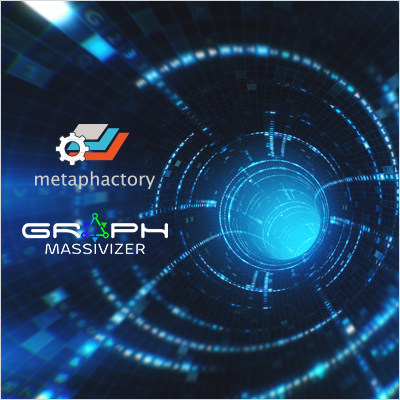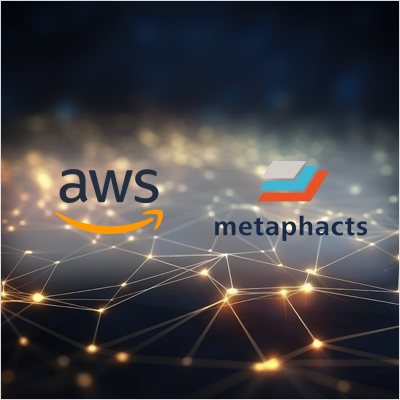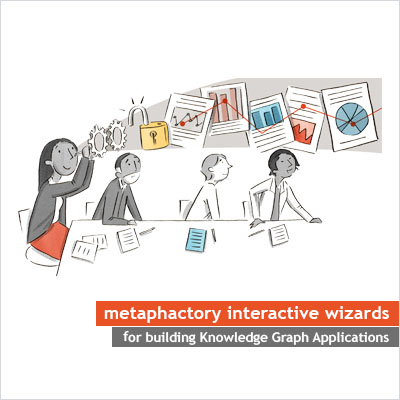Revolutionizing HR Recruiting with Knowledge Graphs and LLMs: Introducing Zenia Graph's HR Recruiting Accelerator
Traditional HR recruiting often feels like searching for a needle in a haystack. Companies are inundated with resumes, and candidates are overwhelmed by the sheer number of job listings. Time-consuming manual processes, coupled with the challenge of finding the perfect candidate-job match, hinder efficiency and lead to suboptimal hiring decisions and missed opportunities. To revolutionize this critical function, Zenia Graph co-founders, Aurelije Zovko and Nina Zovko introduce their HR Recruiting Accelerator, a cutting-edge solution powered by the synergy of knowledge graphs and large language models.
How to create a knowledge graph application with metaphactory and Amazon Neptune
This article is a follow-up in a series where we show how you can use metaphactory to build an end-user application using its dynamic model-driven components, driven by SPARQL queries. It originally appeared on the Amazon AWS blog and was republished and edited with permission from our partners at Amazon AWS.
Exploring app-building in metaphactory with the metaphacts Nobel Prize assets bundle
In this blog post, we discuss the metaphacts Nobel Prize App, where you can explore information and gain deeper insights into the awards, prize winners and uncover any relations between them — all while experiencing the full range of app-building capabilities metaphactory has to offer.
How BKW Energie resolved smart meter choke points with a knowledge graph
This blog post is a recap of a presentation held at the 2023 Knowledge Graph Symposium about BKW Energie's smart meter operations, the data challenges they experienced and how knowledge graphs supported this complex use case.
Using knowledge graph-based LLM for relation & event detection
This post originally appeared on the Ontotext website and is republished and edited with the permission of our partners at Ontotext. In this blog post, we explore Ontotext’s latest knowledge graph-powered solution that works with LLMs to transform raw news content into actionable data for events impact assessment and risk and opportunity detection.
We used a knowledge graph to enhance our CMS. Here’s how it went.
Building massive knowledge graphs using automated ETL pipelines
 In this blog post, we’ll explore how to build a massive knowledge graph from existing information or external sources in a repeatable and scalable manner. We’ll go through the process step-by-step, and discuss how the Graph-Massivizer project supports the development of multiple large knowledge graphs and the considerations you need to take when creating your own graph. Keep reading!
In this blog post, we’ll explore how to build a massive knowledge graph from existing information or external sources in a repeatable and scalable manner. We’ll go through the process step-by-step, and discuss how the Graph-Massivizer project supports the development of multiple large knowledge graphs and the considerations you need to take when creating your own graph. Keep reading!
Visualize and explore knowledge graphs quickly by connecting metaphactory to Amazon Neptune
 This post has also been published on the AWS Database blog.
This post has also been published on the AWS Database blog.
In this post, we show you how to get started with knowledge graphs using the metaphactory platform backed by Amazon Neptune. Offered by AWS Partner Network (APN) Select Technology Partner metaphacts GmbH, metaphactory helps you build knowledge graphs and the smart applications that use them.
The future of libraries and linked data: How the National Library Board of Singapore modernized its data management
In this blog post, we'll discuss the powerful knowledge graph-based solution that transformed NLB's library and resource management, and how you, too, can leverage these tools to support your organization's data-driven use case!
The composable enterprise powered by metaphactory
In this blog post, we discuss metaphactory’s app mechanism that supports the composable enterprise approach and look at the following: the components included in an app, the development-staging-production lifecycle of an app, the architecture of an app and an app example.
GraphDB & metaphactory Part I: Generating Value from Your Knowledge Graph in Days
Large enterprises have identified knowledge graphs as a solid foundation for making data FAIR and unlocking the value of their data assets. Data fabrics built on FAIR data drive digital transformation initiatives that put companies ahead of the competition.
But while the benefits of knowledge graphs have become clear, the road to their implementation has often been long and complex, and success has relied on the involvement of seasoned knowledge graph experts.
This blog post goes through the basics of the joint solution delivered by Ontotext and metaphacts to speed up this journey.
Building a Knowledge Graph Application is easier than ever with metaphactory’s intuitive wizards
Many enterprises have identified Knowledge Graphs as the foundation for unlocking the value of their data assets, easing knowledge discovery and surfacing previously unknown insights and relations in their data. But while the benefits of Knowledge Graphs have become clear, the road to implementation has often been long and complex. Success in making these benefits tangible to the actual business users who interact with and rely on this data on a daily basis has required the involvement of seasoned knowledge graph experts.
In this blog post, we provide an introduction into metaphactory's intuitive and interactive wizards which support application engineers in quickly and visually setting up and configuring search and authoring interfaces that cater to specific end-user information needs. The wizards (introduced recently with the metaphactory 4.2 release ) are one of the pillars of metaphactory's low-code approach for building knowledge graph applications. They allow application engineers to focus entirely on translating end-user information needs into intuitive, model-driven interfaces without getting caught up in the technical details of the semantic technologies stack.
A Knowledge Graph for the Agri-Food Sector
Raul Palma leads the data analytics and semantics department at the Poznan Supercomputing and Networking Center (PSNC), where he coordinates the R&D activities and the center’s participation in various EU projects around these topics. In this guest post for the metaphacts blog, Raul explains how knowledge graph technology can address data integration challenges in the agri-food sector, showcasing it through a few use cases. He describes how he leveraged metaphactory to build a domain-specific application - FOODIE - that delivers intuitive access to distributed, heterogeneous data sources and allows end users to extract meaningful insights.
FOODIE is an agriculture knowledge hub delivered as a Web application built on top of metaphactory Knowledge Graph platform. The application enables an integrated view and access over multiple datasets which have been collected from various and heterogeneous sources relevant to the agriculture sector, transformed, and published as Linked Data / in a Knowledge Graph.











